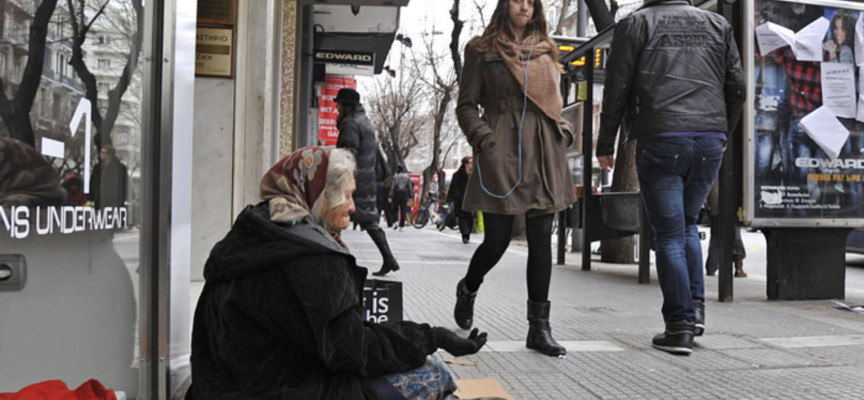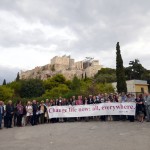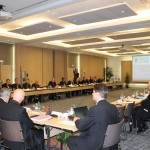Final Statement of the International Workshop of Justice and Peace Europe
The Conference of European Justice and Peace Commissions, representing 22 national commissions of Catholic Bishops’ Conferences, has come to Greece for an International Workshop on theme of Human Dignity and Economic Crisis. In Greece the impact of the crisis has been particularly stark and visible, with people taking to the streets to protest about the widespread unemployment and its consequences. We have come here to reflect on the threats to, and offences against, human dignity that have emerged, and learn about models of good practice for the protection of human dignity.
During the workshop we spent time with the NGOs Praxis and Klimaka, which are providing valuable social outreach initiatives. We visited the Amigdaleza detention centre for people seeking asylum and the Society for the Care of Minors, which looks after under-age migrants. We met with representatives of political parties and the proceedings were opened with a lecture from Prof. Vassilis Karydis, Deputy Ombudsman, who outlined current challenges with reference to the relevant human rights legislative framework.
In an address to the United Nations in May 2014, Pope Francis called for an end to the “economy of exclusion” through actions that will have “a real impact on the structural causes of poverty and hunger, attain more substantial results in protecting the environment, ensure dignified and productive labor for all, and provide appropriate protection for the family”. Similarly, the experience of the NGOs we visited underlines the necessity of ensuring that the basic needs of all members of society are met. People cannot access employment and successfully integrate into society when they are homeless, have no income, or require treatment for physical or mental health issues. These organisations have adopted a person-centred approach, which recognises that our initial response to the most vulnerable must be based on need. In the short-term, the community and voluntary sector plays a vital role in supporting the most marginalised and excluded. The sustainability of these initiatives, in the context of sharp increases in requests for assistance, is a major concern.
While NGOs make a crucial contribution to the alleviation of pressing social need, the structural and systemic factors that trap people in cycles of poverty and deprivation can only be addressed by a change of policy at government level. Policy responses should be informed by the holistic approach to complex needs exemplified by the organisations we visited. Investment in models which empower people to integrate in society and make their contribution benefits the whole of society. During our workshop we saw positive examples of social economy initiatives. These should be further developed and explored as a way of helping individuals and communities to become actively engaged in improving their situation.
From the political representatives we learned about the depth of political alienation that has emerged in Greek society. The crisis has been experienced not only as a political crisis, but also a moral and social crisis, which requires a fundamental change in direction. Those who are suffering the consequences of the economic crisis are frustrated at the systemic failures of leadership and policy that have prioritised financial considerations over basic human rights and wellbeing. The challenge for political leaders, at both a national and EU level, has to be to rebuild trust, by clearly prioritising the needs of people above the demands of the market, thereby inspiring people to re-engage with democratic processes in order to build a Europe of democracy and solidarity. The experience in Greece highlights the need for fairer taxation and investment policies, ensuring that the tax burden is distributed in accordance with the principles of social justice, that tax evasion is effectively combatted and that regulation of the financial sector ensures that financial institutions serve the common good.
Lasting solutions to these problems will need to be supported by policies at European level that put the needs of the most vulnerable at the centre. On 17th October, high-level government representatives from the 47 members of the Council of Europe will meet in Turin to critically examine the progress towards the implementation of the European Social Charter. Together with other NGOs, Justice and Peace Europe will take part in a parallel meeting to mark the International Day for the Eradication of Poverty. These meetings provide a valuable opportunity to reinforce our commitment to the protection of social and economic rights, enshrined in the Social Charter.
A further priority area identified during our workshop is the area of immigration policy and asylum. In Greece, as in many other EU countries, migrants and people seeking asylum are being kept in conditions that fall far short of our responsibility to protect human dignity. The practice of keeping these people, including victims of violence and trauma, in detention in conditions of imprisonment, is a grave injustice. In such conditions, provision for physical and mental health and wellbeing are glaringly inadequate. The right to family life is not respected. The experience is particularly damaging for young people during critical years of their development.
Solidarity and shared responsibility need to be the defining values of our immigration policy at EU level. In practice, this would mean additional supports for those countries which, for reasons of geographical location, are receiving a higher volume of migrants. Dialogue and engagement with countries of origin will be of central importance. In the case of Greece, an important contribution would be to exempt the Greek Government from the obligation to co-funding that is attached to the EU Refugee Fund. As a result of this condition, valuable initiatives that are supporting the integration of migrants risk losing their funding in the near future.
At the conclusion of our workshop, we wish to express our sincere gratitude to our hosts, the Justice and Peace Commission of Greece and the Greek Catholic Church for their willingness to share their experiences. We thank all the organisations that hosted our workshops for giving us an insight into their work. We take back from this experience many valuable insights for our own national contexts and our work at European level. In the community and voluntary and faith-based sectors in Greece we have seen inspiring examples of people who, in spite of limited means, are making a significant difference to the lives and wellbeing of others. This encourages all of us to begin with what we can, as even small initiatives can make an important impact.
The participants of the International Workshop and General Assembly first met in Athens and went on to Corinth. Thus, the gathering became a pilgrimage as well. On Saturday 4th October they celebrated Mass at Areos Pagos Hill at the foot of the Acropolis, where the Apostle St. Paul gave his famous sermon to the Athenians. The Mass, the first public Mass in modern times for Catholics, was presided by Bishop William Kenney, the outgoing President of Justice and Peace Europe. After Mass participants unfurled a banner which read: “Change life now: all and everywhere”, which was the key phrase of St. Paul’s sermon. Re-tracing the footsteps of the Apostle, on the following Sunday, the group celebrated another Mass on the site of the ancient Corinth.
Dichiarazione finale del Laboratorio internazionale di Giustizia e Pace Europa
La Conferenza delle Commissioni europee Giustizia e Pace, che rappresenta 22 commissioni nazionali delle Conferenze episcopali cattoliche, si è incontrata in Grecia per un Laboratorio internazionale sul tema della dignità umana e della crisi economica. In Grecia l’impatto della crisi è stato particolarmente forte e visibile, con gente scesa nelle strade protestare per la diffusa disoccupazione e per le sue conseguenze. Siamo venuti qui per riflettere sulle minacce e le offese nei confronti della dignità umana che sono emerse, ed imparare modelli di buone pratiche per la protezione della dignità umana.
Durante il laboratorio abbiamo incontrato le ONG Praxis e Klimaka, che stanno conducendo valide ed estese iniziative sociali. Abbiamo visitato il centro di detenzione per richiedenti asilo Amigdaleza e la Società per la cura dei minori, che si prende cura dei migranti minorenni. Abbiamo incontrato rappresentanti dei partiti politici e i lavori sono stati aperti da una relazione del prof. Vassilis Karydis, vice-difensore civico, che ha delineato le sfide presenti con riferimento al rilevante quadro legislativo sui diritti umani.
Nel discorso ai membri del Consiglio dei capi esecutivi per il coordinamento delle Nazioni Unite del maggio 2014 papa Francesco ha richiesto di porre fine all’“economia dell’esclusione” con azioni che andranno “a incidere sulle cause strutturali della povertà e della fame, a conseguire ulteriori risultati sostanziali a favore della preservazione dell’ambiente, a garantire un lavoro decente per tutti e a dare una protezione adeguata alla famiglia”. Analogamente, l’esperienza delle ONG che abbiamo visitato sottolinea la necessità di assicurare che si vada incontro ai bisogni fondamentali di tutti i membri della società. Le persone non riescono ad avere accesso all’occupazione e a integrarsi nella società quando sono senza casa, non hanno redditi, o hanno bisogno di cure per problemi di salute fisica o mentale. Queste organizzazioni hanno adottato un approccio centrato sulla persona, che riconosce che la nostra risposta iniziale ai più vulnerabili deve essere basata sul bisogno. Nel breve termine il settore comunitario e il volontariato giocano un ruolo vitale nel sostenere i più marginalizzati ed esclusi. La sostenibilità di queste iniziative, nel contesto di un forte incremento delle richieste di assistenza deve essere la preoccupazione primaria.
Mentre le ONG danno un contributo cruciale nell’alleviare il pressante bisogno sociale, i fattori strutturali e di sistema che intrappolano le persone in cicli di povertà e privazione possono essere affrontati solo con un cambiamento di politica a livello governativo. Le risposte politiche dovrebbero essere caratterizzate dall’approccio globale ai bisogni complessi esemplificato dalle organizzazioni che abbiamo visitato. L’investimento in modelli che danno il potere alle persone di integrarsi nella società e di dare il loro contributo è di beneficio per tutta la società. Durante il nostro laboratorio abbiamo visto esempi positivi d’iniziative di economia sociale. Queste dovrebbero essere ulteriormente sviluppate ed esplorate come un modo per aiutare gli individui e le comunità a diventare attivamente impegnate nel migliorare le loro condizioni.
Dai rappresentanti politici abbiamo appreso della profondità della alienazione politica che è emersa nella società greca. La crisi è stata sentita non solo come crisi politica, ma anche come crisi morale e sociale, che richiede un fondamentale cambiamento di direzione. Coloro che stanno soffrendo le conseguenze della crisi economica sono frustrati per i fallimenti sistemici della leadership e della politica che hanno dato priorità alle problematiche finanziare rispetto ai diritti umani fondamentali e al benessere. La sfida per i leader politici, a livello sia nazionale sia europeo, deve essere quello di ricostruire la fiducia, dando chiaramente priorità ai bisogni della gente prima che alle domande del mercato, portando così le persone a impegnarsi nuovamente nei processi democratici per costruire un’Europa di democrazia e solidarietà. L’esperienza in Grecia mette in evidenza il bisogno di una tassazione più equa e politiche d’investimento che assicurino che il fardello della tassazione sia distribuito secondo principi di giustizia sociale, che l’evasione fiscale venga combattuta in modo efficace e che la regolamentazione del settore finanziario assicuri che le istituzioni finanziarie servano il bene comune.
Soluzioni durature a questi problemi dovranno essere sostenute da politiche a livello europeo che pongano al centro i bisogni dei più vulnerabili. Il 17 ottobre, rappresentanti governativi ad alto livello dei 47 membri del Consiglio d’Europa s’incontreranno a Torino per esaminare criticamente il cammino verso l’attuazione della Carta sociale europea. Insieme ad altre ONG, Giustizia e Pace Europa prenderà parte a un incontro parallelo per definire la Giornata internazionale per lo sradicamento della povertà. Questi incontri forniscono un’opportunità preziosa per rafforzare il nostro impegno nella protezione dei diritti sociali ed economici racchiusi nella Carta sociale.
Un’ulteriore area prioritaria identificata durante il nostro laboratorio è l’area delle politiche dell’immigrazione e dell’asilo. In Grecia, come in molti altri Paesi europei, migranti e richiedenti asilo sono tenuti in condizioni ben lontane dalla nostra responsabilità di proteggere la dignità umana. La pratica di tenere queste persone, incluse le vittime di violenze e traumi, in condizione d’imprigionamento è una grave ingiustizia. In tali condizioni risulta chiaramente inadeguata la tutela della salute fisica e mentale e del benessere della persona. Il diritto alla vita familiare non è rispettato. L’esperienza è particolarmente dannosa per i giovani negli anni critici del loro sviluppo.
Solidarietà e responsabilità condivisa devono essere i valori che definiscono la nostra politica d’immigrazione a livello europeo. In pratica ciò significherebbe sostegno aggiuntivo per quei Paesi che, per ragioni di localizzazione geografica, stanno accogliendo un alto numero di migranti. Saranno di centrale importanza il dialogo e l’impegno con i Paesi d’origine; nel caso della Grecia, un contributo importante sarebbe esentare il governo greco dall’obbligo di cofinanziamento previsto per il fondo europeo per i rifugiati. Come risultato di questa condizione, iniziative preziose che stanno sostenendo l’integrazione dei migranti rischiano di perdere il loro finanziamento nel prossimo futuro.
A conclusione del nostro laboratorio, desideriamo esprimere la mostra sincera gratitudine ai nostri ospiti, la Commissione Giustizia e Pace greca e la Chiesa cattolica greca, per la loro volontà di condividere le loro esperienze. Ringraziamo tutte le organizzazioni che hanno ospitato i nostri laboratori per averci dato una visione del loro lavoro. Riportiamo da questa esperienza molte valide intuizioni per i nostri singoli contesti nazionali e il nostro lavoro a livello europeo. Nelle comunità, nel volontariato e negli ambiti basati sulla fede in Grecia abbiamo visto esempi ispiratori di persone che, nonostante mezzi limitati, stanno facendo una reale differenza per le vite e il benessere degli altri. Questo incoraggia tutti noi ad iniziare con quello che possiamo, perché anche piccole iniziative possono avere un impatto importante.
I partecipanti al Laboratorio internazionale (International workshop) e all’Assemblea generale si sono incontrati dapprima ad Atene e hanno continuato a Corinto. Così l’incontro è divenuto anche un pellegrinaggio. Sabato 4 ottobre hanno celebrato la S. Messa sulla collina dell’Areopago ai piedi dell’Acropoli, dove l’apostolo Paolo tenne il suo famoso discorso agli ateniesi. La Messa, la prima Messa pubblica nei tempi moderni per i cattolici, è stata presieduta dal vescovo William Kenney, presidente uscente di Giustizia e Pace Europa. Dopo la Messa i partecipanti hanno srotolato una bandiera che diceva: “Cambiate vita ora: tutti e dovunque”, che era la frase chiave del sermone di san Paolo. Ripercorrendo le tracce dell’Apostolo, la domenica seguente, il gruppo ha celebrato un’altra Messa ove sorgeva l’antica Corinto.











